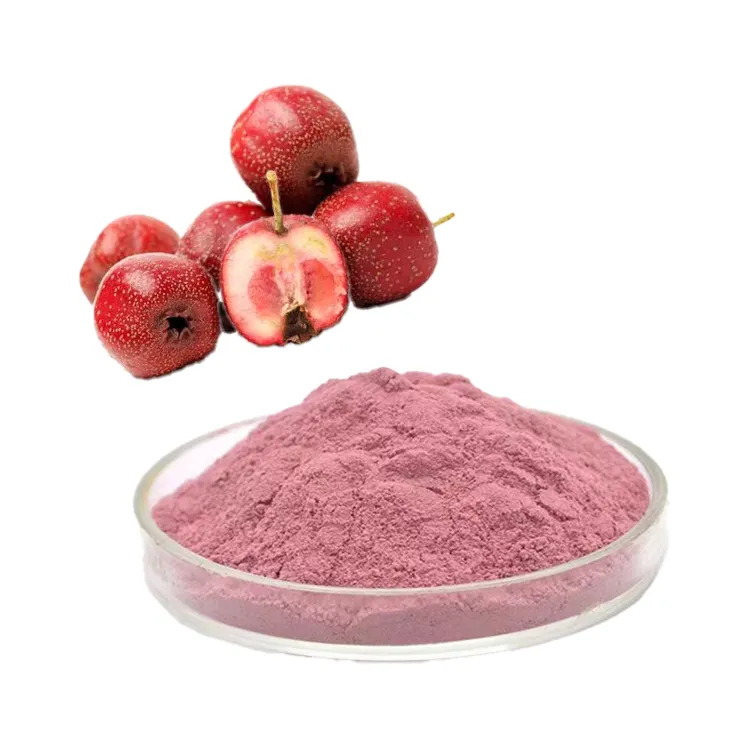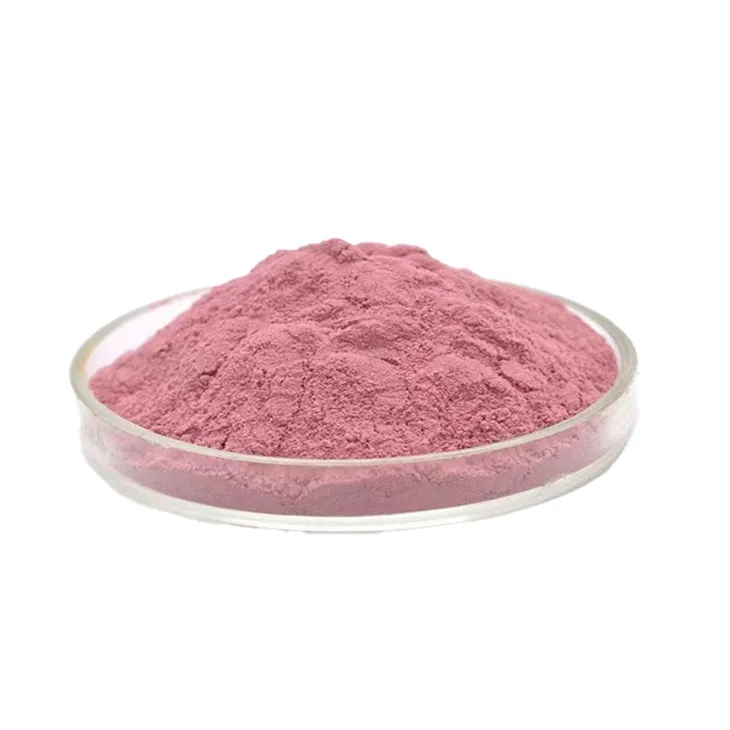- 0086-571-85302990
- sales@greenskybio.com
Hawthorn powder: Benefits and consumption guide.
2024-11-13

Introduction
Hawthorn, a small tree or shrub native to temperate regions of the Northern Hemisphere, has been used for centuries in traditional medicine. Hawthorn powder, which is made from the dried fruits, leaves, or flowers of the hawthorn plant, has gained popularity in recent years due to its numerous health benefits. In this article, we will explore the various benefits of Hawthorn powder and provide a comprehensive consumption guide.

Benefits of Hawthorn powder
1. Cardiovascular Health
One of the most well - known benefits of hawthorn powder is its positive impact on the cardiovascular system. It helps to lower blood pressure by dilating blood vessels, allowing blood to flow more easily. Hawthorn powder also reduces cholesterol levels, particularly LDL (low - density lipoprotein) cholesterol, which is often referred to as "bad" cholesterol. This helps to prevent the build - up of plaque in the arteries, reducing the risk of heart disease and stroke.
Additionally, hawthorn powder has been shown to improve heart function. It strengthens the heart muscle, increasing its pumping efficiency. This can be especially beneficial for those with heart failure or other heart - related conditions. Studies have found that Hawthorn Extract can increase the amount of blood ejected from the heart with each beat, known as the ejection fraction.
2. Digestive Aid
Hawthorn powder can also play a significant role in digestion. It stimulates the production of digestive enzymes, which are essential for breaking down food and absorbing nutrients. This can help to improve digestion and relieve symptoms such as bloating, indigestion, and constipation.
Moreover, hawthorn powder has a mild laxative effect, which can help to keep the digestive system regular. It also contains compounds that can soothe the lining of the stomach and intestines, reducing inflammation and irritation.
3. Antioxidant Properties
Hawthorn powder is rich in antioxidants, such as flavonoids, phenolic acids, and proanthocyanidins. These antioxidants help to protect the body against free radical damage, which can lead to a variety of health problems, including cancer, heart disease, and neurodegenerative diseases.
By neutralizing free radicals, hawthorn powder can also slow down the aging process, improve skin health, and boost the immune system. Antioxidants in hawthorn powder can also reduce oxidative stress in the body, which is associated with many chronic diseases.
4. Anti - Inflammatory Effects
The anti - inflammatory properties of hawthorn powder make it useful for treating a variety of inflammatory conditions. It can reduce inflammation in the blood vessels, which is beneficial for cardiovascular health. It can also relieve inflammation in the joints, helping to ease the pain and stiffness associated with arthritis.
In addition, hawthorn powder may have anti - inflammatory effects on the digestive system, reducing inflammation in the stomach and intestines. This can be helpful for those with inflammatory bowel diseases such as Crohn's disease or ulcerative colitis.
5. Stress and Anxiety Relief
Hawthorn powder has a calming effect on the nervous system, which can help to relieve stress and anxiety. It contains compounds that interact with the body's neurotransmitters, such as gamma - aminobutyric acid (GABA), which is known for its relaxing properties.
By reducing stress and anxiety, hawthorn powder can also have a positive impact on overall health. High levels of stress can contribute to a variety of health problems, including heart disease, high blood pressure, and digestive disorders.

Consumption Guide
1. Dosage
The appropriate dosage of hawthorn powder can vary depending on the individual's age, health condition, and the intended use. In general, a typical daily dosage for adults is between 1 - 3 grams of hawthorn powder. However, it is always best to consult with a healthcare professional before starting any new supplement regimen.
For those with specific health conditions, such as heart disease or high blood pressure, the dosage may need to be adjusted. A healthcare provider can determine the most appropriate dosage based on the individual's medical history and current medications.
2. How to Take
Hawthorn powder can be taken in several ways:
- Mix with Beverages: One of the easiest ways to consume hawthorn powder is to mix it with a beverage. It can be added to hot water to make a tea, or mixed with cold water, juice, or smoothies. When mixing with a beverage, it is important to stir well to ensure that the powder is fully dissolved.
- Capsules or Tablets: Hawthorn powder is also available in capsule or tablet form. This can be a convenient option for those who prefer not to taste the powder. When taking capsules or tablets, it is important to follow the recommended dosage instructions on the product label.
- Incorporate into Food: Hawthorn powder can be added to certain foods, such as oatmeal, yogurt, or baked goods. However, it is important to note that cooking or baking may affect the potency of some of the active compounds in the powder.
3. Precautions
While hawthorn powder is generally considered safe for most people, there are some precautions to keep in mind:
- Drug Interactions: Hawthorn powder may interact with certain medications, particularly those used to treat heart conditions, such as beta - blockers, calcium channel blockers, and digoxin. It is important to inform your healthcare provider if you are taking any medications before starting hawthorn powder.
- Allergic Reactions: Some people may be allergic to hawthorn. If you have a known allergy to plants in the Rosaceae family, which includes hawthorn, you should avoid using hawthorn powder.
- Pregnancy and Breastfeeding: There is not enough research on the safety of hawthorn powder during pregnancy and breastfeeding. It is best to err on the side of caution and avoid using it during these times.

Conclusion
Hawthorn powder offers a wide range of health benefits, from improving cardiovascular health to aiding digestion and reducing stress. However, it is important to use it safely and appropriately. By following the consumption guide outlined in this article and consulting with a healthcare professional when necessary, you can fully enjoy the benefits of hawthorn powder. Whether you choose to mix it with your morning smoothie or take it in capsule form, hawthorn powder can be a valuable addition to a healthy lifestyle.

FAQ:
What are the main benefits of hawthorn powder for the cardiovascular system?
Hawthorn powder can help lower blood pressure, reduce cholesterol levels, and improve blood circulation. It contains bioactive compounds like flavonoids that have antioxidant properties, which can protect the heart from oxidative stress. Also, it may help in preventing the formation of blood clots, thus reducing the risk of heart diseases.
How does hawthorn powder aid in digestion?
Hawthorn powder stimulates the secretion of digestive enzymes, which helps break down food more efficiently. It can also increase the motility of the digestive tract, reducing the likelihood of indigestion, bloating, and constipation. Additionally, it has a mild effect on soothing the stomach, making it beneficial for those with sensitive stomachs.
Can anyone consume hawthorn powder?
While hawthorn powder is generally safe for most people, those who are taking certain medications, especially blood - thinning drugs, should consult a doctor before consuming it. Pregnant women should also be cautious as it may have potential effects on the body during pregnancy. People with known allergies to hawthorn should avoid it.
How should hawthorn powder be consumed?
One common way is to mix it with water or juice and drink it. It can also be added to smoothies or oatmeal for a nutritious boost. The recommended dosage usually ranges from 1 - 3 teaspoons per day, but it's best to start with a small amount and gradually increase if needed. However, it's always advisable to follow the guidance of a healthcare professional.
Are there any side effects of consuming hawthorn powder?
In some cases, excessive consumption of hawthorn powder may lead to side effects such as nausea, dizziness, or low blood pressure. If these symptoms occur, it's important to stop consumption and seek medical advice. Also, as mentioned before, it may interact with certain medications, so proper medical consultation is necessary.
Related literature
- The Health Benefits of Hawthorn: A Comprehensive Review"
- "Hawthorn and Cardiovascular Health: Latest Research Findings"
- "Digestive Aid Properties of Hawthorn in Nutritional Sciences"
- ▶ Hesperidin
- ▶ citrus bioflavonoids
- ▶ plant extract
- ▶ lycopene
- ▶ Diosmin
- ▶ Grape seed extract
- ▶ Sea buckthorn Juice Powder
- ▶ Beetroot powder
- ▶ Hops Extract
- ▶ Artichoke Extract
- ▶ Reishi mushroom extract
- ▶ Astaxanthin
- ▶ Green Tea Extract
- ▶ Curcumin Extract
- ▶ Horse Chestnut Extract
- ▶ Other Problems
- ▶ Boswellia Serrata Extract
- ▶ Resveratrol Extract
- ▶ Marigold Extract
- ▶ Grape Leaf Extract
- ▶ blog3
-
Cranberry Plants and Skin - care Products.
2024-11-13
-
Hops Extract
2024-11-13
-
Golden Seal Extract
2024-11-13
-
Lotus leaf extract
2024-11-13
-
Coconut Water Powder
2024-11-13
-
Fenugreek Extract Powder
2024-11-13
-
Yellow Pine Extract
2024-11-13
-
Green coffee bean Extract
2024-11-13
-
Citrus Aurantii Extract
2024-11-13
-
Garcinia Cambogia Extract
2024-11-13
-
Ginseng Root Extract
2024-11-13





















